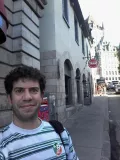
Raul Zazpe: postdoctoral researcher from Spain
A short intorduction: (Who are you? Where are you from? How long have you been in the Czech Republic and at the University of Pardubice...)
My name is Raul Zazpe and I was born in Pamplona, the capital of Navarre (Spain). I studied Chemistry at the University of Navarra and arrived at Pardubice in November of 2015 to join Jan Macak’s group as a postdoctoral researcher.
1/ What is your position at the University of Pardubice? Could you describe it?
I work in the Centre of Materials and Nanotechnologies (CEMNAT) at the University of Pardubice as a postdoctoral researcher in Jan Macak’s group. Basically, our work focuses on nanotubular structures which we coat with other materials to add different functionalities. Composite nanotubes have a wide range of applications, such as catalysts, sensors, in photovoltaics etc… It is important to mention that the deposition of secondary materials lead to a significant improvement of the performance in applications mentioned before. I would also like to point out that the thickness of the materials we deposit is in the range of nanometers, i.e. the millionth part of a millimetre, that is almost atomic scale. I found it really exciting and challenging! A relatively small amount of atoms can trigger great changes in certain chemical and physical properties of the nanostructures.
2/ How do you communicate with your colleagues at the University - are they
supportive?
The communication is generally fluent and smooth. In the group we speak English, and group meetings are in English, too. On the rare occasions when I have to cope with a Czech document, a colleague is next to me to support me and translate it. I cannot complain.
3/ Is it your first professional experience abroad? Why did you decide to live and work in the Czech Republic, in Pardubice?
No, it is not. I went to Cork (Ireland), initially for 6 months, but finally I spent there 3 years. As I found an opportunity to get a grant for 2 years and work towards Master thesis at the Tyndall Institute. That was really unexpected and extremely satisfying. It was an indelible experience. Regarding Czech Republic, I started to look for a postdoctoral position after finishing my PhD, and found an open position in Jan Macak’s group. After reading the project description, I found it attractive and stimulating and decided to apply. Eventually, the positon was offered to me and I accepted; that’s how I got here.
4/Do you remember what your first thoughts were when you discovered that you were going to the Czech Republic?
More than thoughts there were emotions, and the main one was a remarkable thrill. In my opinion, if one wants to continue the researcher career after finishing his PhD, it is crucial to find a postdoctoral position, and fortunately I got it. Besides, I found the country itself pretty attractive. I did not know Central Europe despite I found it particularly interesting. Honestly, I felt somehow blessed.
5/ Was it complicated to move to Pardubice? Did you have to go through any administrative procedure? Did you get any assistance?
The trip to Pardubice was not particularly difficult as I was supported by Jan Macak and Ondřej Srb, who also helped me with some documents I had to fulfil before coming here. I remember Ondřej waiting for me at the train station when I arrived for the first time. It was very helpful and one feels grateful for that. Indeed, I would like to mention that Ondřej assisted me when I had a health issue and had to go to hospital and stay overnight. He was next to me also during the subsequent medical checks and treatment. I am immensely grateful to him. When you are abroad and cannot express yourself and talk to doctors, such support is extremely important.
6/ How is life in Pardubice? Is it hard to live here?
In my opinion, it is lovely and quiet - in a positive fashion. I come from a medium size city of Pamplona (300.000 people), and I think I would not like to live in big cities. Every place here is relatively close and you can walk everywhere, which makes things smooth. At the same time, Pardubice is large enough to find everything you might need and to host different cultural and sport events. In the case you are eager of stronger emotions (opera, big band concert, theatre, etc.) Prague is only one hour away!
7/ What do you think is the best thing about the Czech Republic and Pardubice?
As I said before, the best of Pardubice is its location, only one hour from Prague by train, and its size, as sometimes the size is important, don´t you think so? Regarding Czech Republic, I got fascinated from the very beginning by the Central European way of life and the character of people, clearly different from where I come from. This country has plenty of beautiful natural places and leafy forests, really suitable for tracking. I also confess I like to eat and try typical drinks, and I found Czech food nicely tasteful, and probably the best beer I have ever had.
8/ Do you have a favourite place in Pardubice or a place where you go to get away?
Sure, I like to take walks or run next to the river. If we talk about enjoying some drinks and a pizza with friends, my favourite place is doubtless the pub Lady Gaga, also known by the rest of people as Dydy Baba. Aquacentrum is another place I usually go to do sport and relax.
9/ Besides your work, what do you do in the Czech Republic (hobbies, job, projects…)?
I usually go to gym before work, and sometimes running in the afternoon along the river. Despite I do not practise as often as I would like to, I also like history (I watch documentaries on the Internet), reading, philosophy, languages, etc… to be honest, I would need more time to tackle everything I am interested in. I like to cook too, although to be honest, lately I did not try different things… inspiration is sadly on strike!
10/ Have you been able to make friends and contacts here?
Yes, mainly my colleagues from abroad related to my work and university, but also Czech people. Actually, my girlfriend Zuzu is Czech! The language barrier is an important drawback to start conversations and establish relationships with Czech people. I usually have the feeling that my Czech level is depressive low for the time I have already spent here.
11 /I was told you were from the Basque country. Can you tell us more about this region? Do you miss it? Do you go back there often?
Yes, as I said before I am from Pamplona, the capital of Navarre, which once had been an independent kingdom before it was conquered and incorporated in Spain. The north part of the kingdom behind the Pyrenees remained independent until 1640. Actually, the Shakespeare’s play “Love’s labour’s lost” takes place at Navarre king’s Court. It is hard to describe Navarre in a few words, but I would say that Navarre can be characterized by the strong contrast from north to south that you can find in the climate, geography, character of people, etc…The north is mountainous (Pyrenees) and green, while the south is dotted with extensive croplands and has a drier weather.
Navarre offers lovely gastronomy and Pamplona hosts the Sanfermines, the main festival which was popularized by Ernest Hemingway´s book “The sun also rises” where he described the cheerful atmosphere of the city during the festival. A well-known event is the running of the bulls that takes place every morning of the festival days. I would like to emphasize that both the sea coast and the big mountains are only one hour from Pamplona by car.
Indeed, I miss it but without being homesick. As you can expect, I miss my family and friends, and also several vegetables and fishes, I cannot find here; but this is not a complain at all ;). I go to Pamplona twice a year: Christmas and summer for the festival.
12/Are there any differences between Spanish, Basque culture and Czech?
Yes, there are. For instance, the character is rather different. I do not mean better or worse, just different…. Comparisons can lead to unfortunate misunderstandings. While I find people here generally colder or more reserved, Czech people find us passionate and shrilling… I noticed that we talk much louder. The lunch and dinner times are clearly different… In my town, both are later than here.
13/ Do you know any Czech words? If so, how did you learn them? Which one is the most complicated or funniest to pronounce?
I try to study Czech as often as I can after work. I found a book for Spanish speakers to study Czech. To be honest, I found it difficult, particularly the pronunciation of some words. Czech has some sounds that I never heard before and I found them difficult. The top of tough words is Thursday and number four, although I have improved it, or at least I think so. On the other hand I found very useful the expression Myslím že… or Můžu …? Ale myslím že česky těžký je.
14/ Speaking about language, I was told that Basque Language is very difficult. Could you teach us a few words?
Unfortunately, I could not learn it in the school, but some time ago, I decided to learn on my own. Nevertheless I am far from being fluent. Basque is not easy to learn, but now I found it easier as compared with Czech! It is actually considered one of the oldest languages in Europe with an unknown origin and no relation to any other language.
Some basic words and expressions could be the following: Kaixo is hello, agur is goodbye, Zer moduz? means how are you, gargardo maite dut means I love beer, beste bat means ještě jedno, and non dago komuna? means where is the toilet…? As you can notice, I provided the essential expressions that everyone should know!
15/ If someone was coming from Spain to the Czech Republic, to Pardubice, what advice would you give them?
I would recommend the use of train as transport system as the railway system works well and it is the most comfortable way to travel around the whole country. I would also recommend to be patient if one starts to learn Czech language; it is so different from Latin languages (e.g. French, Italian, Spanish or Portuguese), that usually people find it rather difficult. And for sure, enjoy the natural places one can find in the country, the gastronomy (in particular tatarák, so yummy!!) and the excellent Czech beer. Na zdravi!!!
Caroline Novak-Jolly
Department of International Affairs and Developement

